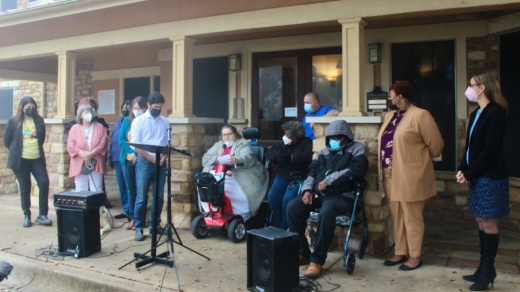One of the two measures drafted by District 4 Council Member Greg Casar would direct city management to engage with local housing and tenant organizations to come up with an extended "cure period," or timeframe in which tenants facing eviction can pay their rent.
After the expiration of statewide pandemic eviction rules late last year, Texans who miss a rent payment can now have a notice to vacate and an eviction order filed against them within a matter of days. The Casar-sponsored ordinance could extend that period in Austin to between seven and 30 days, which he said provides a much needed opportunity to catch up on payment before being forced onto the streets.
"If it took us until that pandemic to recognize what a crisis eviction was in our city, then we need to have learned from that and put in place protections for good," Casar said during a Feb. 1 press conference.
The second item up for approval this week would solidify Austin tenants' right to organize and engage in activities such as meeting with each other and challenging management. Council members at the meeting noted that Texas does not offer broad eviction or organizing protections when compared with other states, a fact that can often block tenant association action and prompt retaliation.
“The reality is that evictions are hitting a little too close to home. And I would be remiss if I didn't talk about the elephant in the room, which is the fact that the state of Texas has largely abandoned their responsibility on renters’ protections and kept local leaders like us from doing a lot more," District 2 Council Member Vanessa Fuentes said.
The early February event announcing both resolutions was held at the Arbors at Creekside Apartments, a complex for seniors, and residents there—as well as from the Rosemont at Oak Valley apartments—spoke to the challenges they faced from their property managers in the past when trying to organize and push for repairs.
Brivelle “Bee” Dumas with the Rosemont tenants association referenced the difficulties and threats she and her neighbors faced at Rosemont after Winter Storm Uri that were partially eased after they organized. And Jeanne Luttrall, a member of the Arbors residents association, said a lack of organizing protections allowed past management at the facility to repeatedly lie to them and block them from open meetings. She also highlighted the need for a longer grace period for renters before evictions are finalized, a worry she said she was able to avoid over the past year while hospitalized due to the extended pandemic rules.
“You shouldn’t end up in, just because of late rent, in a tent under the bridge. It shouldn’t happen," Luttrall said. "My neighbors and I have worked really, really hard to organize a tenant association so management would give us the respect and dignity that we deserve not only as seniors but just as human beings."
The two tenant proposals are Casar's final sponsored policy items as a council member before he steps down to continue his congressional run. While the timelines for both items extend past Casar's last day in office, Feb. 4, the two resolutions' passage this week would likely ensure that final code changes would also receive council support in the coming months.
The two resolutions call on city management to work with groups such as the Ending Community Homelessness Coalition, the Austin Apartment Association and Texas RioGrande Legal Aid to finalize the details of both measures. If they pass, a final eviction ordinance would be due for council consideration by March 24 while the code update covering tenants' organizing rights would be put to council by late July.





